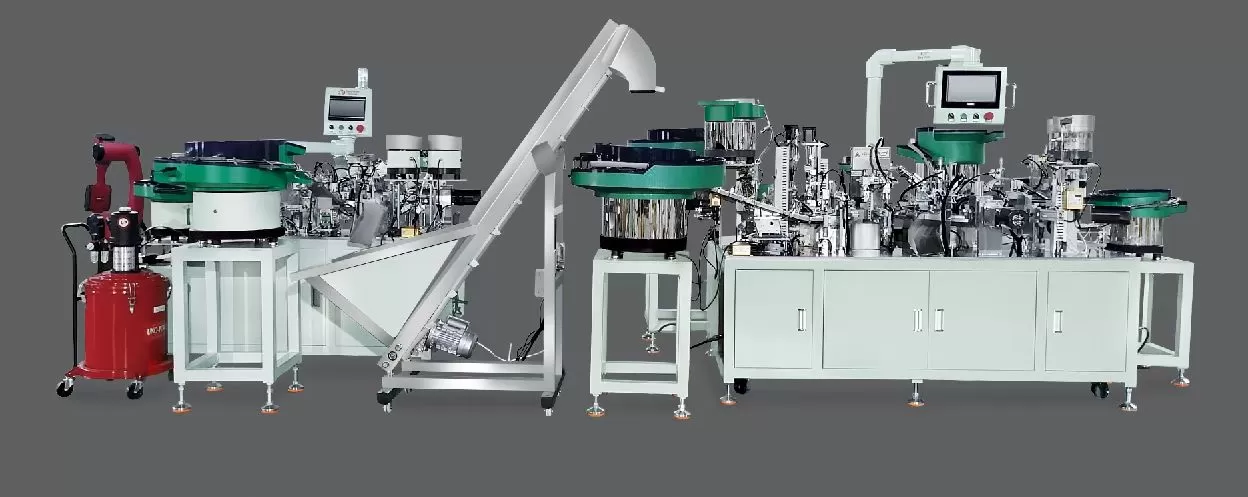In the slide rail manufacturing industry, production efficiency is a key factor affecting the competitiveness of enterprises. Slide rail automatic assembly machines, as core equipment in modern production, have brought revolutionary changes to the industry. They achieve full automation of the assembly process, reduce manual operations, and enhance production efficiency in various aspects, with SanyHore being a leading force in promoting this technological advancement.
A primary advantage lies in optimizing assembly precision and speed. Traditional manual assembly of slide rails often struggles with inconsistent precision due to human factors, as workers may apply uneven force or misalign components. This not only affects product quality but also slows down the assembly pace. SanyHore's slide rail automatic assembly machines, however, utilize high-precision servo motors and advanced vision positioning systems. These technologies ensure that each component—such as rails, rollers, and brackets—is aligned and installed with micron-level accuracy. The machines can complete multiple assembly steps in a coordinated sequence, from feeding to locking, at a speed that manual operations can hardly match. For instance, SanyHore's latest models can assemble over 40 slide rail sets per minute, significantly cutting down the time required for mass production.
Minimizing material waste and rework is another critical aspect where these machines excel. Manual assembly is prone to errors like incorrect part installation or excessive force, leading to damaged components or non-functional slide rails. Such defects necessitate rework or scrapping, which wastes materials and consumes additional labor hours. SanyHore's automatic assembly machines are programmed to strictly follow pre-set parameters, ensuring that each operation—whether inserting pins, adjusting tension, or testing smoothness—is executed with consistent accuracy. Equipped with real-time inspection sensors, the machines can immediately detect defective products during the assembly process and remove them from the production line, thus reducing rework rates to less than 0.5% in typical scenarios. This not only saves materials but also keeps the production flow uninterrupted.
Moreover, SanyHore's slide rail automatic assembly machines enable uninterrupted 24/7 production. Manual workforces require breaks, shift changes, and time off, which create inevitable gaps in production schedules. Even with multiple shifts, the transition between workers can cause delays and disrupt workflow continuity. In contrast, SanyHore's machines can operate continuously as long as there is a steady supply of raw materials and regular maintenance. This round-the-clock operation maximizes the utilization of production facilities, especially in large-scale manufacturing plants, where it can increase daily output by 30% or more compared to manual lines.
The integration of multi-stage processes into a single unit further boosts efficiency. Traditional slide rail production lines often involve separate stations for cutting, forming, component installation, and testing, with semi-finished products transported between stations manually or by conveyor belts. This fragmentation leads to longer lead times and increased risks of damage during transportation. SanyHore's automatic assembly machines streamline these processes by integrating feeding, cutting, assembly, testing, and packaging into a single automated system. Components move seamlessly through internal channels, eliminating the need for external transportation and reducing process time by up to 40%.
Additionally, the intelligent data management capabilities of SanyHore's equipment provide valuable insights for optimizing production. These machines are equipped with IoT-enabled systems that collect real-time data on assembly counts, error rates, energy consumption, and machine performance. Managers can access this data through a centralized dashboard, allowing them to identify bottlenecks, adjust production schedules, and predict maintenance needs. For example, if the data shows a sudden increase in jamming incidents, the system can alert operators to check the feeding mechanism, preventing prolonged downtime. This proactive approach to production management ensures that the assembly line operates at peak efficiency consistently.
In summary, SanyHore's slide rail automatic assembly machines enhance production efficiency through precise and fast operations, reduced waste, continuous production, process integration, and intelligent management. These advancements not only lower production costs but also enable manufacturers to meet market demands more quickly and reliably. As the industry continues to evolve, such automated solutions will remain pivotal in driving the growth and competitiveness of slide rail manufacturers.

